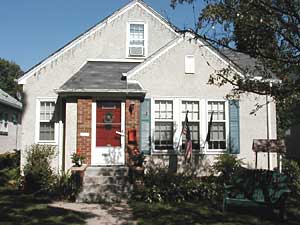|
Photos
Resources
|
July 27, 2005
 |
| Teresa Amelsberg Crowe faces eviction from the south Minneapolis home she once owned, but says was duped into selling because of her money problems. (MPR photo/Dan Olson) |
Minneapolis, Minn. — Minnesota's law wasn't enacted soon enough to help Teresa Amelsberg Crowe.
She faces eviction this week unless she can find enough money to keep making rent payments on the south Minneapolis house she once owned. Her predicament began when she ran short of money. The debts included school payments for her son and unexpected medical bills.
"I had to pay the last $10,000 for his private schooling, and then I totaled out my car by hitting a semi-truck and was laid up for three months and that's how it started," she says.
Stretched to the financial breaking point, Amelsberg Crowe searched for a way out. The country's booming real estate market appeared to offer a path. Like millions of other Americans, she decided to refinance her mortgage, and tap the equity in her home to help pay her bills.
Her troubles deepened when she fell into the arms of an unscrupulous real estate agent. Teresa Amelsberg Crowe's attorney, Ann Bottolene, says the agent led her into a classic mortgage foreclosure scam. Bottolene says the agent told Amelsberg Crowe her poor credit rating gave her only one option.
"'Oh, we're sorry. At the very last minute, we can't refinance your house, instead in order to save your house, we have to sell it to someone else,'" is how Bottolene related the conversation.
The someone turned out to be the unscrupulous real estate agent.
She bought the house and agreed to rent it back to Amelsberg Crowe with an option to buy. However the purchase price, based on what the real estate agent says is the house's increase in value, is much more than Amelsberg Crowe can afford. And she can't get at the $60,000 equity she was expecting from the deal, because the real estate agent says that money is being held in escrow.
Amelsberg Crowe is angry and embarrassed. She did what few other victims of mortgage foreclosure scams do. She scraped up money to hire an attorney, challenge the deal in court, and tell her story with the hope it will help others avoid a similar financial disaster.
"I knew my credit was bad and stuff, and I just believed them, and I basically got duped," she says.
Teresa Amelsberg Crowe became a victim before Minnesota's law designed to rein in mortgage foreclosure scams was enacted. The law was written in part by Prentiss Cox, the former head of the consumer division of the Minnesota Attorney General's office.
Cox, now a clinical professor of law at the University of Minnesota, says victims often agree to much larger payments than they can possibly make, and perpetrators make huge profits on reselling the property. Cox says the law addresses both issues.
"It sets standards to make sure the homeowner has the ability to pay off the transaction, and the second is, it puts a floor there, what every civilized society should do, which is to say you can't profit unconscionably from these transactions," Cox says.
Cox and others say it's too early to tell if the law is effective, but he says it has caught the attention of unscrupulous agents and lenders.
Elsewhere, consumer advocates say, the number of people falling victim to mortgage scams specifically, and predatory lending generally, is exploding. The reason? Consumer advocates say a growing number of Americans are pinched financially. Their search for ways to refinance their house, or in some other way borrow money, creates a vast and fertile market for predatory lenders.
There's little in the way of federal law to stop the abuses. In fact Ira Rheingold, the director of the National Association of Consumer Activists, a Washington, D.C. advocacy group, says a bill in the U.S. House would have the effect of rolling back some of the state laws -- including Minnesota's -- that regulate predatory lending practices.
"Several states -- North Carolina, New Jersey, New Mexico -- have passed pretty good predatory lending laws that had a real impact on their communities," says Rheingold. "The only real interest Congress appears to have right now in passing any laws is to preempt those laws, and not allow states to regulate the mortgage lending industry."
Kathleen Keest says the bill before Congress fits a pattern. Keest directs the South Carolina-based Center for Responsible Lending, another advocacy group. Nearly every session for the past two decades, consumer advocates have lobbied Congress for federal laws to control the burgeoning predatory lending practices of the financial services industry.
Every session, Keest says, they are outmaneuvered by the banks and other lenders who tell members of Congress they can police themselves.
"That never has worked, and there's no enforcing industry standards," Keest says.
Another argument raised by lenders against stronger consumer protection laws is "Buyer beware, the borrower needs to watch out for himself." Keest doesn't buy it. She disagrees with the view that the nation's huge consumer lending industry can be held blameless for its predatory lending practices.
"Where's the morality in saying, if you're burglarized when you got your window open it's your fault, as opposed to the burglar who comes in the window?" says Keest.
Lack of success in Congress has not deterred consumer activists from putting pressure on more states and even cities to enact anti-predatory lending laws. And they are encouraging states to sue lenders over practices which are causing a growing number of Americans to sink into financial distress.






